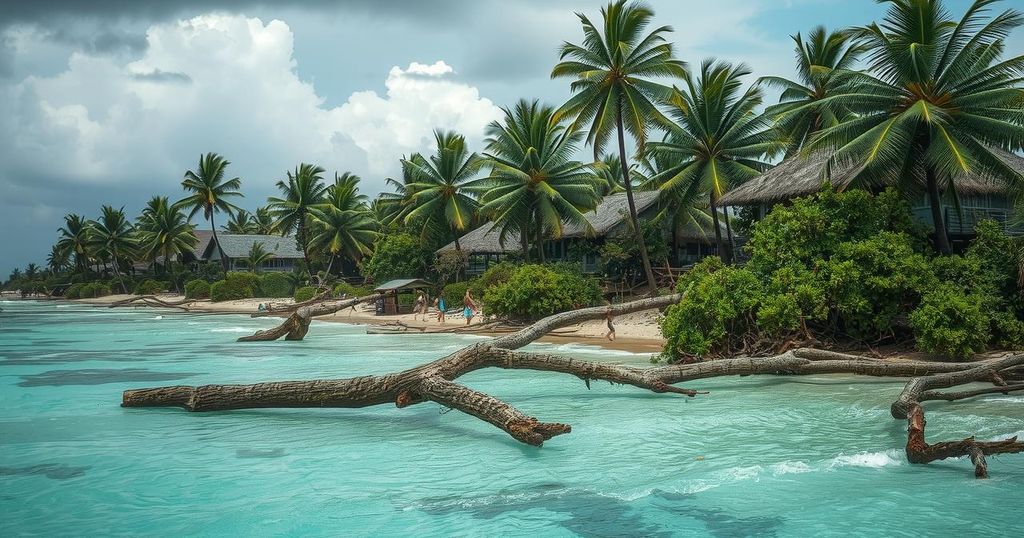Tropical Cyclone Chido has wreaked havoc across Mozambique, displacing over 450,000 people and resulting in significant infrastructure damage. Fatalities have reached 120, with health emergencies, including a choleral outbreak, complicating the recovery process. The affected regions, particularly Cabo Delgado and Nampula provinces, are in urgent need of humanitarian assistance to address immediate basic needs and restore livelihoods. Coordinated efforts are essential to provide aid and prevent further crises, including gender-based violence.
Tropical Cyclone Chido has caused extensive destruction across Mozambique, particularly affecting communities in Cabo Delgado and Nampula provinces. On December 15, the cyclone made landfall, unleashing torrential rains and fierce winds, leading to the displacement of nearly 454,000 individuals, many of whom face severe humanitarian crises. Critical infrastructure, including homes, schools, and healthcare facilities, has been compromised, with particular hardships reported for those already fleeing violence from non-State armed groups. The ongoing cholera outbreak exacerbates the public health situation, creating a dire need for immediate humanitarian intervention.
Assessments by the National Institute for Natural Disasters (INGD) have reported at least 120 fatalities and over 868 injuries directly linked to Cyclone Chido, along with thousands of destroyed homes and critical services. The immediate requirements include safe temporary accommodations, food, clean water, and medical supplies to combat the ramifications of water-borne diseases. Additionally, the affected populations require substantial support to restore their livelihoods through agricultural aid. Reports indicate that the situation is worsened by the compounded crises of drought, cholera, and ongoing conflict within the region.
Local authorities and humanitarian organizations are coordinating efforts to provide relief and address the growing needs. Although the government has enacted preparedness measures that saved lives through evacuations and early warnings, the scale of damage has outstripped the resources available to humanitarian agencies. Serious concerns around violations related to gender-based violence have also been documented, necessitating immediate action and funding to ensure a survivor-centered approach to these issues.
With the cyclone response operations currently facing significant financial constraints during a critical fundraising period, urgent replenishment of humanitarian stocks is imperative. This crisis unfolds against a backdrop of existing upheavals, underscoring the necessity for a holistic approach to aid that encompasses health, protection, and immediate basic needs for the affected populations in Mozambique.
Tropical Cyclone Chido, which struck Mozambique in December 2024, led to significant devastation and loss, repeatedly affecting communities already grappling with instability from ongoing violence and natural disasters. The cyclone not only triggered extensive damage to infrastructure but also posed serious public health risks, particularly due to a choleral outbreak in the wake of the disaster. The National Institute for Natural Disasters (INGD) assessed the situation, reporting severe impacts on both urban and rural populations, necessitating immediate intervention to address the comprehensive humanitarian needs arising from this disaster. The affected regions particularly include Cabo Delgado and Nampula provinces, where preexisting societal challenges have compounded the crisis, leading to heightened vulnerabilities for displaced communities. The multiplicity of factors such as existing political conflict, drought, and infrastructural damage underscore the urgency for a coordinated humanitarian response to restore stability within these communities.
In summary, the humanitarian crisis following Tropical Cyclone Chido in Mozambique demands immediate and comprehensive action to address the pressing needs of nearly half a million affected individuals. The compounded challenges of existing conflict, a choleral outbreak, and infrastructural destruction necessitate urgent humanitarian support to mitigate the risk of further casualties. It is imperative that humanitarian agencies rapidly scale up efforts to provide the essential services, protections, and supplies required by the vulnerable populations to restore their lives and communities. The need for additional funding and resources remains critical to sustain the response and adequately support those impacted by this disaster.
Original Source: reliefweb.int






